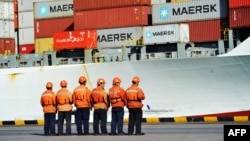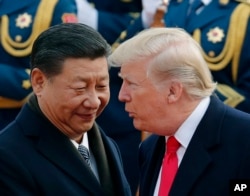The escalating U.S.-China trade war will inhibit global economic growth this year and next, the International Monetary Fund said Tuesday, even as U.S. President Donald Trump again threatened to impose higher tariffs on Chinese exports sent to the United States.
In a new assessment issued at its meeting in Bali, Indonesia, the IMF predicted that "everyone is going to suffer," as the U.S. and China — the world's two biggest economies — spar over tariffs and other trade issues. It said the dispute between the U.S. and China would especially leave developing economies vulnerable to sudden stresses.
The international finance agency dropped its projection for world economic growth by two-tenths of a percentage point for both 2018 and 2019 to 3.7 percent, the first time it had trimmed its economic outlook in more than two years.
It predicted 2.9 percent U.S. growth this year, dropping to 2.5 percent next year, and to 1.8 percent in 2020, as the effect of U.S. tax cuts wears off and the trade war with China inhibits growth.
"There is no denying that the susceptibility to large global shocks has risen," the IMF's top economist Maurice Obstfeld told reporters.
The U.S. and China have imposed higher tariffs on tens of billions of dollars' worth of products the two countries have exported to each other, with no immediate end in sight to the tit-for-tat dispute. Trump has justified the higher U.S. tariffs as a response to the trade imbalance between the two countries, and China has swiftly responded with higher levies on U.S. imports.
Last year, China shipped goods worth $375 billion more to the U.S. than it took in from the United States, a figure Trump has often said he wants to curb sharply in an effort to promote American businesses.
Trump renewed his threat to impose tariffs on $267 billion worth of additional Chinese imports if Beijing retaliates further with its own higher levies on U.S. products entering China.
"China wants to make a deal, and I say they're not ready yet," Trump said. "I just say they're not ready yet. And we've canceled a couple of meetings because I say they're not ready to make a deal."
He contended that China had "already retaliated" against his tariff increases. In September, Trump imposed tariffs on nearly $200 billion of Chinese imports, with China responding with higher tariffs on about $60 billion of U.S. imports.






